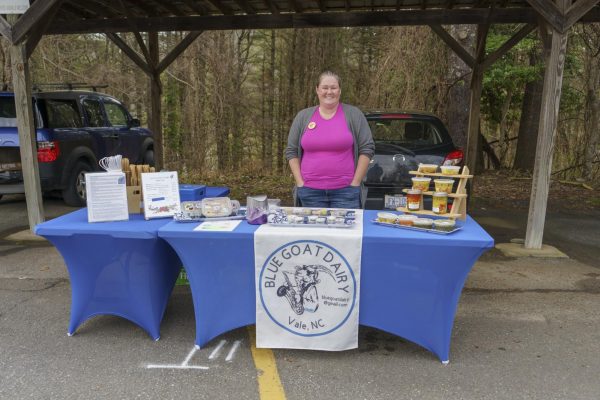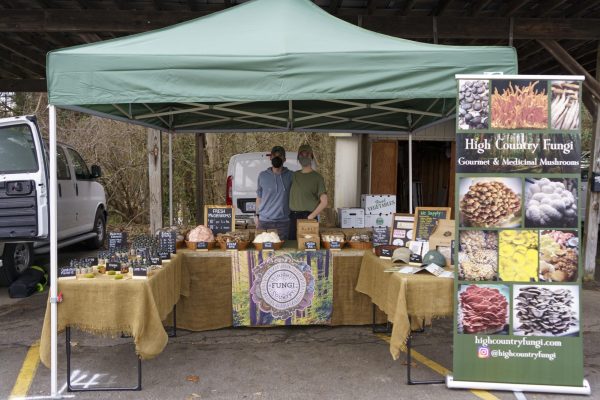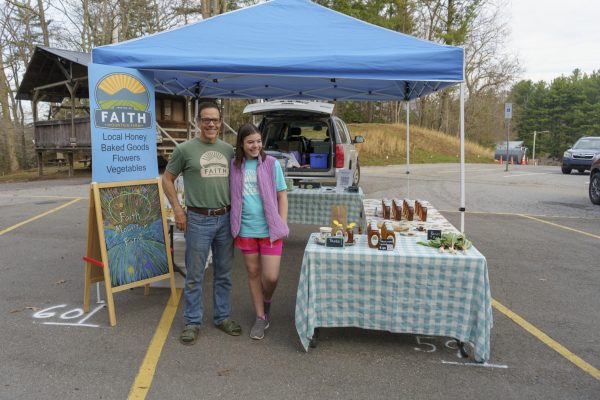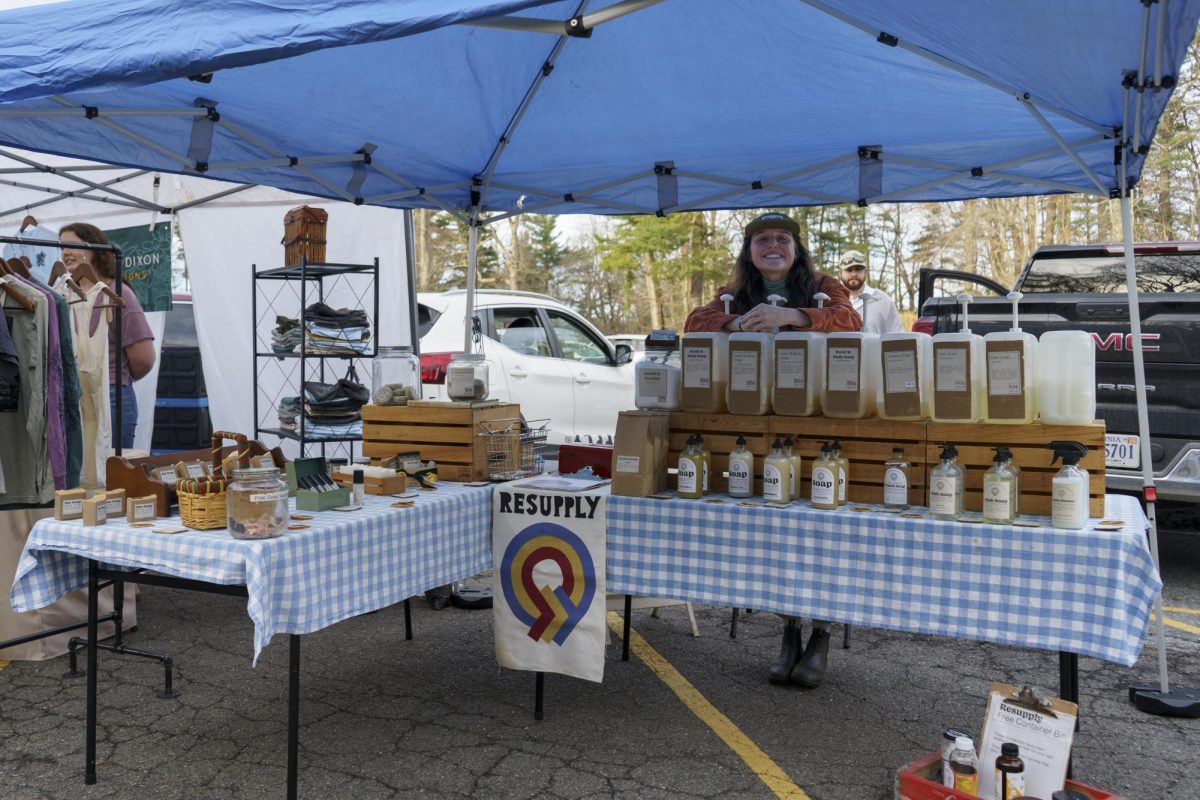After reconstruction efforts from Hurricane Helene, local farmers were back at the Watauga County Farmers’ Market April 5. The market holds its annual spring opening every April with vendors from all over Western North Carolina.
“A lot of our vendors are still in recovery from the hurricane,” said Michelle Dineen, the market director. “They need the community’s support now more than ever.”
Six months ago, farmers in the Western North Carolina area were devastated by Hurricane Helene and many struggled to continue producing and selling their goods, facing destruction of property, a reduction of crops and general loss due to the storm.
Ever since its first season over 50 years ago, the market has operated from 8 a.m. until noon each Saturday morning, from April to November. The market was nearing the end of its 2024 season when everything halted.
The market, according to Federal Emergency Management Agency regulations, had to quickly move from its main location, Daniel Boone Park, to the parking lot of Leon Levine Hall in the weeks after Helene’s touchdown.

The new location along with the wreckage following the hurricane caused many farmers to miss out on income, Dineen said.
The market’s abrupt end last season was a loss for local attendees, but a necessity for the well-being and continuity of the market, especially farmers and harvesters of local products who rely on weather, climate and local farmers’ markets to make a profit.
At this year’s opening, there were over 60 vendors, many of which had to drop out of the 2024 season. There is expected to be a greater push toward local farmers and shop owners this year due to a rise in community since Helene, Dineen said.
“There’s both a community and culture within the vendors, we know each other and have relationships,” said James Wilkes, a computer science professor at App State and a honey bee farmer.
Wilkes has been operating his stand, Faith Mountain Farm, for 20 years and has seen the market mature over the years. He sells a variety of honey, granola, baked goods, vegetables and cut flowers.
“This is a very robust, mature market in terms of quality,” Wilkes said
Another popular vendor from the market is Fermenti, a fermented food and goods company based in Asheville and Marshall with farms in both locations.
Started by Meg and Lars Chamberlain, the pair has been fermenting and selling their own jarred and packaged products since 2017. Fermenti offers products such as kimchi, sauerkraut, fermented lemons and salsa. They also offer a variety of salts and seasonings for food to make at home.
Fermenti’s Marshall farm suffered significant damages from Helene and their production facilities lost several batches of product, resulting in immense production and financial losses. Despite their losses in the middle of Helene’s aftermath, Meg Chamberlain said the support the company received from the community of Boone was truly life-changing.

“We have a deep gratitude towards the Boone community,” Meg Chamberlain said. “The support was exactly what we needed when we needed it.”
Avery Hughes, owner of High Country Fungi, has been working with the market for five years and sells mushroom products alongside his partner.
For a lot of local vendors, the biggest month for sales is October, Hughes said. With the impact of Helene, a lot of the diverse market stalls had to roll back which caused them to lose money. Many of these vendors, Hughes said, are still working to bounce back from the storm.
The community of the market was described by Hughes as “very tight-knit, especially post-Helene.”
“It’s been reaching out to folks and folks reaching out to us and helping in any way we could,” Hughes said.
There has been a noticeable shift toward local vendors post-Helene, Hughes said. Many people are buying local goods now more than ever since it builds up the community. This shift has created a sense of solidarity among the buyers and sellers of the market, Hughes said.
“Hopefully with the impact that Helene had locally that people will realize the importance of local food,” Hughes said.
Devin Lacey, owner of Booze & Bouquets Flower Farm and Floral Design, said he has a deep appreciation for locals and the community of Boone and wants to continue to sell his product at the Watauga County Farmers’ Market for as long as he can.
Booze and Bouquets is a local florist company with plots located in Watauga and Caldwell counties. Although their business mainly caters toward weddings, the company has been a vendor ever since joining the market’s 2012 season.

An App State alum, Lacey fell in love with all things horticulture in the Watauga area and cultivated a space in Boone where people can buy local flora at an affordable price, a price that has not changed in the past six years.
“It’s about spreading joy and seeing people walk away happy with my product,” Lacey said.
Lacey said he is thankful to report that while his floral plots sustained water damage
and plants fell over during the hurricane, no other critical damage was done.
“I feel very lucky to have scathed by with very minimal damage, compared to most,” Lacey said.
While plenty of stands have vendors trying to sell products to customers, not all booths sell products, such as the Blue Ridge Women in Agriculture’s stand.
BRWIA is a nonprofit organization that assists all locals in sustainably accessing quality produce in Boone and the surrounding areas. Operating since 2003, the organization partners with many farmers in the area for their High Country Food Hub, where people can order boxes of produce and meals online to cook and eat at home.
BRWIA also offers its Double Up Food Bucks program, a food-based
incentive where people can donate money in exchange for tokens to use at the Watauga market and other farmers’ markets in the surrounding region.
The program’s coordinator, Sydney Blume, emphasized the importance of a program like this existing in Boone, and how it not only connects people to ethical produce consumption, but also with local farmers and growers.
“People often see local food as this luxury, and we really don’t want that to be the case,”
Blume said. “We think that farmers’ market food should be more accessible to everyone, and this is one way we can get closer to doing that.”
Blume said the BRWIA staff prepared to brace for the hurricane’s impact before Helene, and open communication and utilizing teamwork with staff and local farmers was the key to success in the future of the Double Up Food Bucks program.
“We are reflecting on, and so grateful for the networks that we had in place in order to
respond more rapidly,” Blume said.



